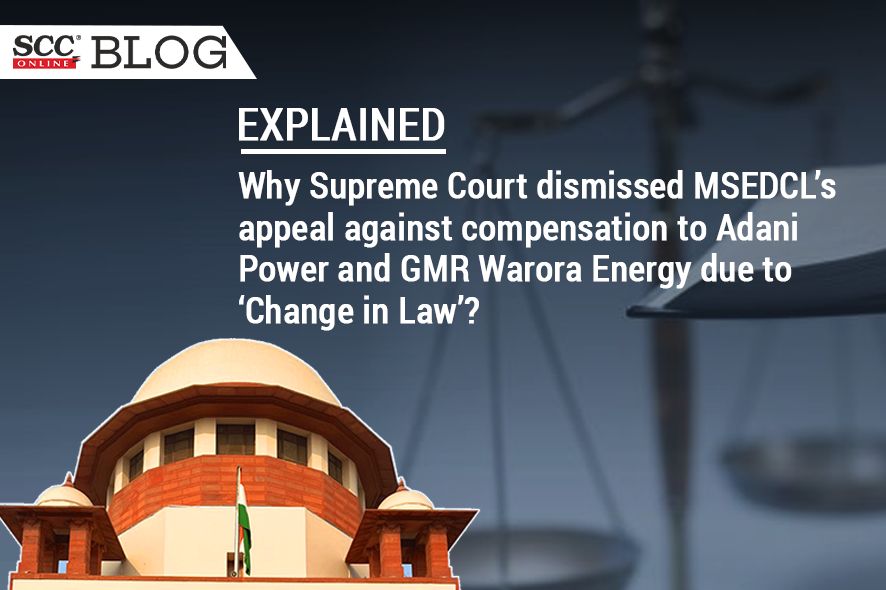Supreme Court: Exercising its civil appellate jurisdiction, the division bench of B.R. Gavai* and Vikram Nath J.J., allowed the compensation on account of a ‘Change in Law’ for non-supply of committed domestic coal and upheld the judgement passed by APTEL. The bench noted that on account of Change in Law, the generating companies were entitled to compensation so as to restore them to the same economic position, if the Change in Law had not occurred.
Factual Matrix
In the matter at hand, Maharashtra State Electricity Distribution Company Limited (‘MSEDCL’) entered into long term Power Purchase Agreement with Adani Power Maharashtra Limited (‘APML’) which also had a ‘Change in Law’ clause.
In 2007, the Center had issued a New Coal Distribution Policy according to which APML applied for coal, linkable to the Ministry of Coal. Accordingly, Western Coal Limited (‘WCL’) and South Eastern Coal Limited (‘SECL’) issued Letters of Assurance in favour of APML to supply coal. Thus, the Fuel Supply Agreement (‘FSA’) was executed between APML and WCL for domestic coal linkage. Subsequently, the FSA was amended, and the quantum of coal assured by WCL was transferred to SECL.
On 26-07-2013, the Ministry of Coal issued a memorandum approving revised arrangement for supply of coal to the identified Thermal Power Stations.
On 31-07-2013, a letter was issued to the Central Electricity Regulatory Commission (‘CERC’) and the State Electricity Regulatory Commission to consider as pass-through in tariff of the cost of alternate coal, which was procured to meet shortfall in supply of domestic linkage coal.
APML filed a petition before the Maharashtra Electricity Regulatory Commission (‘MERC’) claiming compensation on account of ‘Change in Law’ which had approved a framework for determination of compensatory fuel change.
Thereafter, APML filed another petition before MERC for approving a framework for determination of compensatory tariff which was provided by MERC and the review petition challenging the same was accordingly dismissed by MERC.
Further, on 28-01-2016, a revised tariff policy was issued consequent to which APML had filed appeals before the Appellate Tribunal for Electricity (‘APTEL’) challenging the order passed by MERC leading to MSEDCL filing cross appeals. APTEL, however, remanded back the matter for fresh consideration and allowed the claims of APML in view of the ‘Change in Law’ with some restrictions.
APML challenged the order passed by the MERC before the APTEL which had held that it was entitled to compensation on the ground of ‘Change in Law’ based on the Station Heat Rate (‘SHR’) specified in the Multi Year Tariff Regulations 2011 of actual SHR achieved by APML, whichever is lower and the compensation approved by MERC would be computed based on the actual Gross Calorific Value (‘GCV’) of coal received. Aggrieved by the same, MSEDCL approached Supreme Court by way of the present petition.
In the connected matter, GMR Warora Energy Limited (‘GMR’) had claimed compensation on account of impact of ‘Change in Law’ during the operation and constitution period, out of which some claims were allowed while rest were dismissed. Subsequently, GMR had approached APTEL in appeal during the pendency of which it further filed a petition before the CERC which passed the order in favour of GMR and the same was subsequently assailed by MSEDCL before APTEL. Finding no merit in the appeal APTEL dismissed it, therefore, the present petition contested by MSEDCL.
Court Analysis
The Court while referring to Jaipur Vidyut Vitaran Nigam v. Adani Power Rajasthan Limited, 2020 SCC OnLine SC 697 and Energy Watchdog v. Central Electricity Regulatory Commission, (2017) 14 SCC 80 opined that on account of the ‘Change in Law’, the generating companies were entitled to compensation so as to restore the party to the same economic position as if the ‘Change in Law’ had not occurred. Had the Change in Law not occurred, the generating companies would have been entitled to the supply as assured by the Coal Companies under the FSA.
The Court stated that the stand taken by the Distribution Companies (‘DISCOMS’) that, since the loss being sustained by the generating companies was on account of non-fulfilment of obligation by Coal Companies, they should be relegated to the remedy available to them in law against the Coal Companies, was totally unreasonable.
The Bench was of the view that in spite of this legal position and the stand taken by the Union of India, the DISCOMS are taking a stand which is contrary to the stand of the Union of India.
The Court while referring to Central Warehousing Corporation v. Adani Ports Special Economic Zone Limited, 2022 SCC OnLine SC 1398 noted that DISCOMS were instrumentalities of the State which had taken a contrary view to that of the Union Government which contemplated that the generators would be entitles to pass-through for the coal required to be imported or purchased from the open market on the ground of ‘Change in Law’.
[Maharashtra State Electricity Distribution Company Limited v Adani Power Maharashtra Limited, 2023 SCC OnLine SC 233, decided on 03-03-2023]
Judgment authored by Justice B.R. Gavai
Advocates who appeared in this case :
For the appellant- Senior Advocate Gopal Jain, Advocate G. Sai Kumar;
For the State Electricity Distribution Companies- Additional Solicitor General Balbir Singh, Senior Advocate and M.G. Ramachandran;
For the respondent- Senior Advocate Abhishek Manu Singhvi and Advocate Vishrov Mukherjee.






